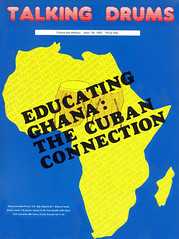A Plane Misfires
Ghanaian Times
The world community deserves some respite from what appears to be a policy of the superpowers to keep the world always in a condition of tension and mankind keyed up all the time. But fortunately for everyone, the latest super-power play, the Soviet downing of what was said to be a South Korean- owned Boeing 747, has too many comical aspects to it. If it is true that the plane went down with 269 people, that would be tragic. The rest of the story sounds like a comic tale.Points to note about the incident are:
Although the U.S. was able just minutes after the incident to come out with details of the communications which it said it had picked between the plane and the Soviet interceptor jet fighters, and between the U.S. authorities and the plane, it took several days for the U.S. to say that it had its own spy plane, a Boeing 747, in the area. But it is curious that the Soviets did not detect that huge plane. That after-thought ex- planation of how the U.S. authorities had knowledge of details of the incident looks like a ploy to cover up the probability that the aircraft shot down was the spy plane itself.
The downed plane was supposed to be a South Korean, presumably civilian, plane. If it was, then we are curious that for the two good hours that the Soviet jets hovered round it, trying to force it to a safe landing, the pilot failed to respond and to say whether it was in some distress, especially since the plane had strayed some 500 kilometres into Soviet space and had its navigation lights off.
The U.S. sources were also reported to have claimed that when the plane was spotted in the sea the Soviets had removed the 269 bodies! How was that done?
Quite surprisingly, the South Korean authorities seem not to be too bothered by the incident. Even under pressure by Parliament to take a serious view of the issue, the South Korean Foreign Minister more or less brushed it off by reportedly saying that the Government felt that the matter should be carefully handled. Was it a South Korean plane?
The speed with which wreaths were laid in the sea at the spot where the plane went down gives the impression that someone wants certain human aspects of the incident to be forgotten fast, particularly in the region, to avoid a situation where emotional pressure in the area may force a closer look at the wreckage.
One hopes that 269 lives were not lost in the incident, and that only a spy plane and its crew took the expected consequences of the game. That would be an acceptable sacrifice for what looks like one of the stakes in the US Presidential election campaign. It appears that the Republican Party - the incumbent, indeed is in dire need of a crisis of this nature for expressing holy anger as a demonstration of its ability to sustain the Reaganity policy of maintaining the "strong America" image.
Obviously, the Reagan Administration had hoped to use the US Euromissiles confrontation with the Soviet Union to press this posture, having used the promise of such a posture in the campaign against Jimmy Carter for his "softness" towards the Soviets to win the last election.
Unfortunately, the Soviets took the wind out of the Administration's sails when Yuri Andropov announced last August 27 that the Soviet Union is prepared not only to withdraw all its medium-range missiles from Europe, but also to destroy them, in return for its own demand that the US should stop its proposed deployment of new missiles in Europe. Thus the Soviets have taken the initiative in the efforts to end the confrontation, thereby clearly eliminating the question of a "strong America" as an influence on the Soviet position.
Averting The One-Party Snag
The Punch, Nigeria
President Shagari's statement that his party had no intention of imposing a one-party state on the country is reassuring and commendable.We agree with Mr. President that a right wing one-party state could prove disastrous in a nation like ours noted for its tradition of legitimatised opposition and a virile press.
We also believe that in view of our cultural and ethnic plurality, a right wing one-party state is ill-advised and is bound to exacerbate inter-ethnic conflict and drag the nation into the mire of perennial crises.
While saying this, it is our contention that there is a great fear that while we are officially a multi-party state we may in actuality be operating a one-party state.
Already we have a one-party dominant state which is just a short step to a one-party state. The thinly veiled difference between a one-party dominant state and a one-party state is that the former flourishes in a multipartism but is so overbearing that all other political parties could pose no threat of its preponderance. It could therefore be as powerful or more powerful than a one-party state.
The latter is a de-facto one-party state backed up by legislation. A legalised one-party state is extremely dangerous.
There is, therefore, the possibility that a one party in a multi-party state having control of the legislature and the executive could embark on a policy of repression and intimidation of the press.
This, we believe is the crux of the matter.
The NPN is in control of the National Assembly and eleven state governments. The party could therefore make and unmake, the only check perhaps is the eternal vigilance of the people backed by a virile press.
President Shagari's option therefore in light of his abhorrence of a one-party state is to caution his men in the national and state assemblies. The executive should also exercise caution.
Anything short of this, will amount to an indirect imposition of a one-party state.
